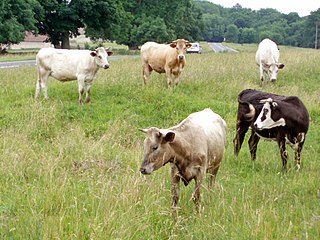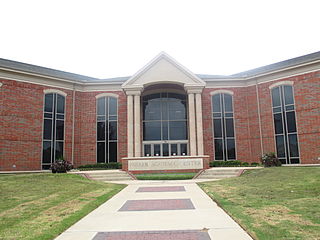
The tragedy of the commons is a term used in environmental science to describe a situation in a shared-resource system where individual users acting independently according to their own self-interest behave contrary to the common good of all users by depleting or spoiling that resource through their collective action. The concept originated in an essay written in 1833 by the British economist William Forster Lloyd, who used a hypothetical example of the effects of unregulated grazing on common land in Great Britain and Ireland. The concept became widely known as the "tragedy of the commons" over a century later due to an article written by the American ecologist and philosopher Garrett Hardin in 1968. In this modern economic context, commons is taken to mean any shared and unregulated resource such as atmosphere, oceans, rivers, fish stocks, roads and highways, or even an office refrigerator.

Hardin County is a county located in the U.S. state of Illinois. According to the 2010 census, it has a population of 4,320, making it the least populous county in Illinois. Its county seat is Elizabethtown. Hardin County is located in the part of the state known as Little Egypt. Hardin County was named for Hardin County, Kentucky, which was named in honor of Colonel John Hardin, an officer in the American Revolutionary War and the Northwest Indian War.
Reputation or image of a social entity is an opinion about that entity, typically as a result of social evaluation on a set of criteria.
Distributed Artificial Intelligence (DAI) also called Decentralized Artificial Intelligence is a subfield of artificial intelligence research dedicated to the development of distributed solutions for problems. DAI is closely related to and a predecessor of the field of Multi-Agent Systems.
In Ireland and the United Kingdom, housing associations are private, non-profit making organisations that provide low-cost "social housing" for people in need of a home. Any budget surplus is used to maintain existing housing and to help finance new homes and it cannot be used for personal benefit of directors or shareholders. Although independent, they are regulated by the state and commonly receive public funding. They are now the United Kingdom's major providers of new housing for rent, while many also run shared ownership schemes to help those who cannot afford to buy a home outright.

Foundation is a science fiction novel by American writer Isaac Asimov. It is the first published in his Foundation Trilogy. Foundation is a cycle of five interrelated short stories, first published as a single book by Gnome Press in 1951. Collectively they tell the early story of the Foundation, an institute founded by psychohistorian Hari Seldon to preserve the best of galactic civilization after the collapse of the Galactic Empire.

John Wesley Hardin was an American Old West outlaw, gunfighter, and controversial folk icon. The son of a Methodist preacher, Hardin got into trouble with the law from an early age. He killed his first man at age 14, he claimed in self-defense.

In a social context, trust has several connotations. Definitions of trust typically refer to a situation characterized by the following aspects: One party (trustor) is willing to rely on the actions of another party (trustee); the situation is directed to the future. In addition, the trustor abandons control over the actions performed by the trustee. As a consequence, the trustor is uncertain about the outcome of the other's actions; they can only develop and evaluate expectations. The uncertainty involves the risk of failure or harm to the trustor if the trustee will not behave as desired.

Computational sociology is a branch of sociology that uses computationally intensive methods to analyze and model social phenomena. Using computer simulations, artificial intelligence, complex statistical methods, and analytic approaches like social network analysis, computational sociology develops and tests theories of complex social processes through bottom-up modeling of social interactions.
An autonomous agent is an intelligent agent operating on an owner's behalf but without any interference of that ownership entity. An Intelligent agent, however appears according to a multiply cited statement in a no longer accessible IBM white paper as follows:
Intelligent agents are software entities that carry out some set of operations on behalf of a user or another program with some degree of independence or autonomy, and in so doing, employ some knowledge or representation of the user's goals or desires.
Behavioural sciences explore the cognitive processes within organisms and the behavioural interactions between organisms in the natural world. It involves the systematic analysis and investigation of human and animal behavior through the study of the past, controlled and naturalistic observation of the present, and disciplined scientific experimentation and modeling. It attempts to accomplish legitimate, objective conclusions through rigorous formulations and observation. Examples of behavioral sciences include psychology, psychobiology, anthropology, and cognitive science. Generally, behavior science deals primarily with human action and often seeks to generalize about human behavior as it relates to society.
A digital identity is information on an entity used by computer systems to represent an external agent. That agent may be a person, organization, application, or device. ISO/IEC 24760-1 defines identity as "set of attributes related to an entity".

Garrett James Hardin was an American ecologist and philosopher who warned of the dangers of human overpopulation. His exposition of the tragedy of the commons, in a famous 1968 paper in Science, called attention to "the damage that innocent actions by individuals can inflict on the environment". He is also known for Hardin's First Law of Human Ecology: "We can never do merely one thing. Any intrusion into nature has numerous effects, many of which are unpredictable."
Reputation systems are programs that allow users to rate each other in online communities in order to build trust through reputation. Some common uses of these systems can be found on E-commerce websites such as eBay, Amazon.com, and Etsy as well as online advice communities such as Stack Exchange. These reputation systems represent a significant trend in "decision support for Internet mediated service provisions". With the popularity of online communities for shopping, advice, and exchange of other important information, reputation systems are becoming vitally important to the online experience. The idea of reputations systems is that even if the consumer can't physically try a product or service, or see the person providing information, that they can be confident in the outcome of the exchange through trust built by recommender systems.

The University of Mary Hardin–Baylor (UMHB) is a Christian co-educational institution of higher learning located in Belton, Texas, United States. UMHB was chartered by the Republic of Texas in 1845 as Baylor Female College, the female department of what is now Baylor University. It has since become its own institution and grown to 3,914 students and awards degrees at the baccalaureate, master's, and doctoral levels. It is affiliated with the Baptist General Convention of Texas.
In information security, computational trust is the generation of trusted authorities or user trust through cryptography. In centralised systems, security is typically based on the authenticated identity of external parties. Rigid authentication mechanisms, such as Public Key Infrastructures (PKIs) or Kerberos have allowed this model to be extended to distributed systems within a few closely collaborating domains or within a single administrative domain. During recent years, computer science has moved from centralised systems to distributed computing. This evolution has several implications for security models, policies and mechanisms needed to protect users’ information and resources in an increasingly interconnected computing infrastructure.
Cybermethodology is a newly emergent field that focuses on the creative development and use of computational and technological research methodologies for the analysis of next-generation data sources such as the Internet. The first formal academic program in Cybermethodology is being developed by the University of California, Los Angeles.

A Delaware statutory trust (DST) is a legally recognized trust that is set up for the purpose of business, but not necessarily in the U.S. state of Delaware. It may also be referred to as an Unincorporated Business Trust or UBO.
Vancouver City Savings Credit Union, commonly referred to as Vancity, is a member-owned financial co-operative headquartered in Vancouver, British Columbia. By asset size, Vancity is the largest community credit union in Canada as of 2017, with $26.4 billion in assets, 59 branches and more than 525,506 members.









